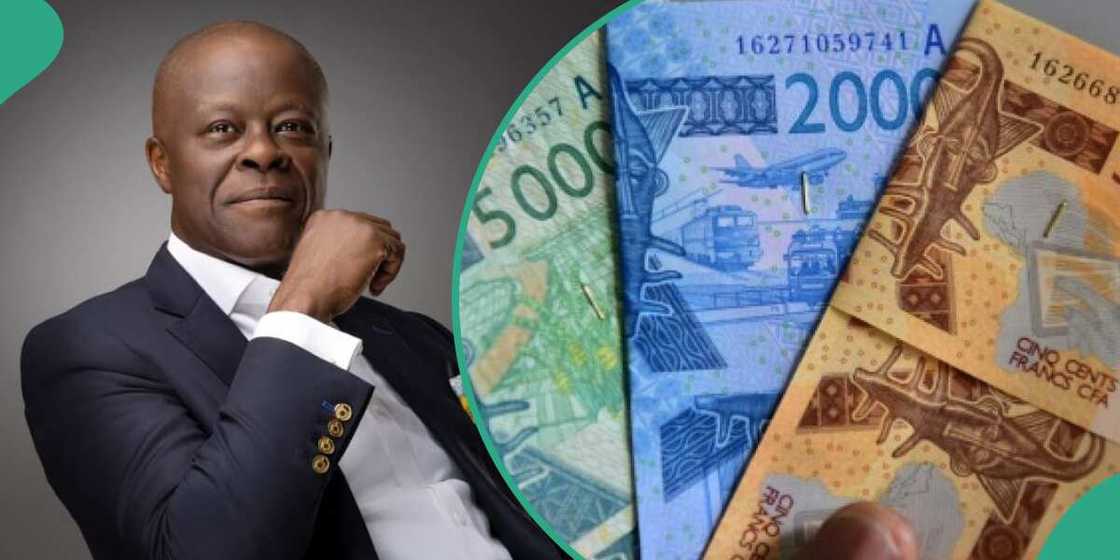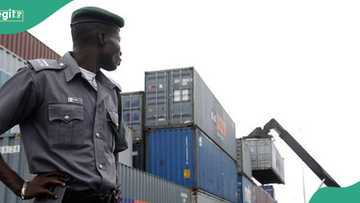Nigeria Considers Possibility of ECOWAS Single Currency as Naira Dips
- Nigeria has expressed optimism on the ECOWAS single currency, Eco, despite the convergence score dip
- This is as the Nigerian currency, the naira, has been struggling to keep up with the exchange rates of major currencies
- Nigeria's finance minister Wale Edun has reiterated the country's unwavering dedication to the WAMZ project
Legit.ng journalist Victor Enengedi has over a decade's experience covering Energy, MSMEs, Technology and the stock market.
Nigeria's finance minister and coordinating minister of the economy, Wale Edun, remains hopeful about the feasibility of the proposed monetary union and single currency for the West African Monetary Zones (WAMZ).
This comes despite the recent failure of member states to meet the established convergence criteria.

Source: UGC
The development follows an earlier report by Legit.ng that Nigeria has yet to decide on the next course of action for the adoption of the Economic Community of West African States (ECOWAS) single currency, "Eco", by member states.
This is subsequent to the failed promise by ECOWAS to begin the use of the regional bloc's single currency in 2020.
Nigeria's naira struggles
The Naira has been facing challenges against major currencies in recent months, both in official and unofficial markets.
According to data from FMDQ Securities, the Nigerian Autonomous Foreign Exchange Market (NAFEM) witnessed the Nigerian currency closing at a rate of N1602.75 to the dollar.
Additionally, reports from Legit.ng indicate that on Saturday, March 16, 2024, the dollar was traded at N1,610, slightly lower than the previous day's rate of N1,615.
ECOWAS nations believe that if a single currency is developed and accepted, it could help balance the depreciation of individual currencies against major currencies like the dollar, pound and euro.
Nigeria's position on ECOWAS single currency
Edun's optimism on the eventual use of the single currency follows the release of the latest progress report on the project, which revealed a decline in performance scores for WAMZ member states.

Read also
Naira gains against the dollar for 2 straight days in official market despite UK agency’s prediction
According to BusinessDay, in 2023, these states not only fell short of meeting the criteria for adopting a single currency but also saw their performance score decrease to 29.2% from 41.7% in 2022.
The single currency initiative entails each member state meeting four key criteria: maintaining an inflation rate of 5%, sustaining a fiscal deficit GDP ratio of 4%, limiting deficit financing by the central bank to 10%, and ensuring a sufficient level of gross official foreign exchange reserves equivalent to at least six months of imports.
According to the agreement establishing the zone, the convergence criteria must be met and maintained within a specific timeframe.
However, member states have experienced setbacks and inconsistencies in meeting the prescribed targets over the past several years.
During the 51st ordinary session of the WAMZ convergence council in Abuja, Edun reiterated Nigeria's unwavering dedication to the WAMZ project and pledged to strive towards accomplishing its objectives.
Edun, currently the Chair of the WAMZ Convergence Council for the next six months, emphasized the significance of prioritizing the overarching goal of fostering a genuinely integrated, competitive, and prosperous sub-region.
He stressed the importance of upholding essential disciplines, fulfilling commitments to convergence, and attaining stability to realize this vision.
He said:
“What we all seek to achieve in terms of the regional economic integration may be difficult but not impossible. I am sure we have the wherewithal and resilience to realize the ambition. We just need to be very smart in our planning and prioritization, as well as decisiveness in our actions. We must, as a bloc, work together to strengthen and improve the economies of the Zone.”
It should be noted that ECOWAS member states have resumed convergence to the launch of the ECOWAS single currency in 2027.
Speaking on the matter, Job Ikpaga, an economist, told Legit.ng that the Eco holds immense potential for economic integration and stability across West Africa.
He said:
"By streamlining trade and investment, it would facilitates smoother transactions, encourage cross-border commerce, and reduce exchange rate risks. Eco would promote greater financial inclusion and regional cooperation, fostering a stronger sense of unity among member states.

Read also
Nigeria’s external reserves rise by 2.83% as CBN says Nigeria witness upsurge in forex inflows
"With a single currency, businesses can expand more confidently across borders, stimulating economic growth and job creation. Moreover, Eco would enhance the region's bargaining power in global markets and strengthen its resilience against external economic shocks."
He added that overall, the adoption of Eco signifies a significant step towards shared prosperity and development in West Africa.
Niger, Mali, Burkina Faso withdraw from ECOWAS
In related news, Legit.ng reported that the military rulers of Niger, Mali and Burkina Faso withdrew their countries from the membership of ECOWAS.
According to reports the three countries issued a joint statement on Sunday, January 28, 2024, and stated that the withdrawal was with immediate effect.
Niger, Mali, and Burkina Faso said in the statement that they don't feel their economic interests are not guaranteed.
PAY ATTENTION: Unlock the best of Legit.ng on Pinterest! Subscribe now and get your daily inspiration!
Source: Legit.ng




